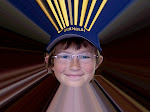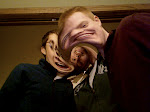Monday, April 28, 2008
Shift Happens--III
It's a challenge to simply stay updated with the provocative youtube postings, responses,and updates! Welcome to the digital world of information!:-}
Shift happens
I would be intrigued to hear the rest of this presentation with requisite roundtable discussions with educators. In my opinion, educators are held up to increased scrutiny as being resistant to technological integration and or the all-encompassing "change" that the previously mentioned video describes.
I would contend that the dominant political parties are too busy endlessly bickering over 20th century social issues ala civil unions for gays & lesbians, gun laws, and abortion. Instead of having a Marshall Plan approach to a myraid of 21st century issues ranging from environmental concerns, re-designing the public school system to reflect a digital, information based society as opposed to an agricultural-industrial society.
And I would argue that the American people have been so lulled to sleep via the opiates of professional sports & the unending pursuit of consumer acquisition and consumption, that our present political and societal leadership doesn't bode well for the digital generation of students sitting in classrooms. Nearly a generation of underfunding public education has left schools with barely enough to sustain themselves year to year much less take on paradigm shifts to the degree that "Shift Happens" proposes need to happen.
The US may be a uni-power militarily speaking however our country has lost its way when it comes to being a world leader in educational innovation, technology research and integration, and certainly as a force for global good (such a quaint concept lost these last years with the Texas Ranger and his neocon posse running amok in the White House and abroad!).
As an educator, this all can be quite daunting. I will continue to follow the words of Emily Dickinson and light a candle in the darkness and make a difference in the lives of those that I interact with!
Thursday, November 29, 2007
Coming to scale with educational technology
The issue of scaling up is so pertinent to the individual teachers enrolled in this course as we wander through the joys, challenges, and complications of educational technologies. The goal of the Microsoft funded program (in the first reading) is to support research specific and effective applications of technology in classrooms and analyze why they work and more importantly how can the particular activity be applied ( or ramped up) to widespread implementation in classrooms beyond a specific charter school or classroom.
This semester has been a wonderful intellectual enterprise. I have consistently made powerful connections betwixt my History of Science course (Technology and American Culture) and this Education course. Of the many themes --historical and technological--I've explored this semester one in particular resonated with our readings this week. Throughout American history innovations and new technologies initially are integrated into society with little public or government resistance or discussion. Henry Ford's Model T, Bell's telephone, the steam engine, even the development of the atomic bomb initially were seen as positive examples of the American spirit of progress (both economically or militarily) and scientific advancement. As the technologies are enhanced, enlarged or made more widespread, growing concern as to their long term impact or consequences is articulated. Clearly this theme is evident as linked to technology and education.
The most fascinating part of 21 st century information technology as it relates to classroom applications is the rapid pace of development and diffusion. The pace of technological innovations has been so rapid it has left the public discussion and conversation so far beyond it has almost has become moot. The Brave New World is here whether we like it or not!
My final project is on Media Literacy in this Brave New World. Even though 1997 seems like a technological eon ago, educators, consumers, and citizens must continue to engage in courageous conversations about the role of technology in the lives of our students. I have a feeling that the Brave New World of 2007 is going to look awfully blase to the Brave New World of 2027!
Thursday, November 15, 2007
Overdosed and frustrated
Fitz's Second Life
I would invite all of my readers to check out my website at
http://sffitzgerald.googlepages.com/
On the technology page of the website you'll find evidence of my baby steps with several technology tools from powerpoint to moviemaker. Rock on.
Thursday, November 8, 2007
Media Literacy & multi -tasking
Of the eleven core competencies discussed in Jenkins report, one jumped out at me-- it was multi-tasking. Jenkins described schools as having taught students to be farmers ( one step following another) rather than hunters (adapting to changing conditions, thinking quickly, responding efficiently). I think students need to be able to be hunters and farmers. More importantly, I think multitasking is over-hyped as a skill. There are times and activities that lend themselves to multi-tasking (washing dishes while making almond poppyseed muffins) and others do not (driving and talking on a cell phone). My students spend hours longer on homework cause they feel compelled to text message, download and listen to music, and attempt to read a densely written history essay.
Thursday, November 1, 2007
From Freeware to Free Expression
Jay's comments connect ever so fluidly with the philosophy of Constructivist teaching and learning, a common theme throughout this course. It seems that the idea of students expressing themselves is not a "new" idea (see the 1960's Free Speech Movement). What can be considered new as far as student expression in the Digital Information Age is shown in the proliferation of social networking sites. Students are creating their MyFaceSpacebook (my agglomeration which makes my adolescent nieces crazy!) pages for others to interact with and respond to. The challenge to teachers as Jay (alludes to) is to have students as excited about creating and sharing their American history project as they would be in modifying their own MySpace profiles. On some levels education needs to be revamped from one that reflects its origins in the Industrial- Mass-Produced -Standardized -Society. When I reflect on the topics we've read and discussed in class, it seems that education needs to be revamped to reflect the Digital- Information -Collaboration-Creative society that our students will work and live in! The paradigm shift that that will entail makes my head hurt!
I often wish I could time travel and listen in on conversations of educators in the early 20th century as new technologies like electricity, radio, automobiles, and telephones massively reshaped society and what it meant to be educated or successful.
The Henry Jenkins report Confronting the Challenges of Participatory Culture: Media Education for the 21st Century was hard to disagree with. I found several points particularly compelling. Jenkins called for
a. a shift in the focus of the conversation about the digital divide from questions of technological access to those of opportunities to participate AND to develop cultural competencies and social skills needed for full involvement.
b. adult acknowledgement of the creation of new participatory cultures and adolescents' engagement in them.
c. a systemic approach to media education.
What really struck me was how media competency and skills create a new "hidden curriculum" which can prove to be a barrier for student success depending on their access to technology whether at school or at home. While technology integration has been a significant motivating force in my school district, the really, really, really big emphasis has been targeted at the achievement gap as it impacts students of color, non-native speakers, and immigrants. Seems to me that these two driving forces (technology integration and diversity training) could unify around this shared issue.
iToons
London 2005
Enroute to the Tower of London



